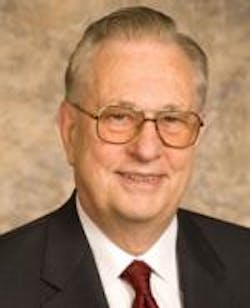“The challenge today, however, is that our societies are infused with technologies that are at once complex and ubiquitous. That makes the dialogue about science and technology much more difficult, but also immensely more important to get right.” –Dr. Arden L. Bement, Jr., director of the National Science Foundation
One of the things that’s been so frustrating about the ongoing effort to lower emissions from commercial trucks over the last decade is an almost total lack of either appreciation or understanding of the science – and price tag – by the general public.
We’re on the verge here of adding another $12,000 or so to the base cost of a single Class 8 tractor – after a roughly $7,000 to $9,000 per unit hit three years ago – and the impact of that surcharge is going to be felt far and wide in this industry … but elicit maybe at most a yawn from anyone outside it. That ignorance is but one reason why truckers haven’t been able to get any sort of price break for these emission system mandates; and why the public at large still views trucks as “dirty” despite all the advances in science and technology at work here.
This is part and parcel of the strange dichotomy affecting our society today, I think. So much technology surrounds us and makes our day-to-day life so easy that we take it all for granted. It’s long been noted that the public looks down on trucks and trucking, yet relies heavily on that very same industry for its high quality of life. By extension, we demand clean energy and less pollution, yet won’t make the lifestyle changes necessary to achieve those twin goals.
Dr. Arden L. Bement, Jr. (at right), director of the National Science Foundation (NSF), took note of this worrisome trend in a speech a while back – and for a scientist, this guy makes some very compelling and straightforward arguments as to why everyone, truckers included, needs to be more aware of what’s going on in scientific circles and how that science can eventually impact all of our lives.
“Democratic ideals and values can be at risk in an increasingly technological society when we do not educate and fully engage citizens in dialogue on critical issues,” he said in a speech entitled Science, Policy and the Public at the Royal Academy Symposium in Washington, D.C., in July.
“At a minimum, we need a clear statement of the science. Although this seems obvious, science that is accessible to policy makers and the broader public is in short supply,” Bement stressed. “Communicating science is a complex endeavor, but one we must work to achieve. We also need an analysis of possible policy options, and a transparent decision making process … [because] engaging citizens in genuine dialogue is the essential final ingredient – yet one that presents enormous challenges.”
Bement pointed to a recent public opinion survey on energy issues conducted by Public Agenda as an example of the disconnect between science and society today. That survey revealed that 51 percent of those surveyed could not name a renewable energy source; 39 percent could not name a fossil fuel. Yet what struck him as most significant about the survey was that, despite a lack of knowledge about energy sources, three quarters of those surveyed believe that the U.S. should move toward increased use of alternative energy even if oil prices go down.
“These strong attitudes appear to be based on a very slim base of knowledge,” Bement warned. “Crude as this snapshot may be, it points to a pervasive and serious problem – and one that lies at the heart of broader dialogue on emerging technologies. We need an informed public to arrive at informed decisions. It is a fundamental responsibility of everyone to promote and support science, technology, engineering and mathematics education at all levels. Without this goal, our decisions will be made ‘exclusive-ly,’ not inclusively.”
He noted that in the case of emerging technologies that are very complex – and emission control systems for trucks, along with biofuels, certainly fit that category – we as a nation require sophisticated and subtle solutions, the very best we can devise.
"The nexus between science and engineering and policy is not a new subject, but more urgent today as technology penetrates every aspect of our lives,” Bement said. “This is the arena in which science and policy should work hand in glove – but very often don't!”
As for the broader societal dimensions of scientific advances, he shared an approach voiced by the famous seventeenth century Japanese swordsman, Miyamoto Musashi: In strategy it is important to see distant things as if they were close, and to take a distanced view of close things.
“This advice applies to the intersection of science, technology and policy no less than it does in considering strategy,” Bement continued. “Although this perspective may sound at first like a contradiction, the deeper reality is that we must see emerging technologies from ‘without,’ which is the citizen's standpoint, and we must find a way to help citizens see it from ‘within’ as researchers do.”
In the end, he said, that puts us all together in the same boat – steering for the future, with all its uncertainties and its promises, but with a shared understanding of where we’re heading and why.
